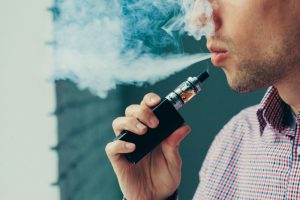Can Vaping Make Sleep Apnea Worse?
February 28, 2020

In an effort to curtail the damaging effects of smoking traditional cigarettes, smokers and non-smokers alike are taking up e-cigarettes, popularly known as vapes. With 8 million Americans regularly vaping, and traditional cigarette use reaching a record low in 2018, a CDC (Centers for Disease Control and Prevention) study indicates that vaping numbers are on the rise. While many folks turn to e-cigarettes as an alternative to burning tobacco, the number of first-time tobacco users is also increasing and largely consists of young adults.
Contrary to the prevalent belief that vaping offers a healthy alternative to smoking, the recent e-cig epidemic introduces a slew of new toxins to inhale, followed by various health problems for consumers. Individuals who use vapes face serious health risks, including lung damage, asthma, cardiovascular disease, and heart attack, due to the contents of the vapor in e-cigarettes. The vapor contains nicotine, as well as toxic chemicals and metals, some of which are too recently introduced to discern the true long-term consequences of inhalation. In addition, vaping inhalation, much like traditional cigarette smoking, impacts your sleep cycle by creating inflammation in the nose and upper airway.
What is Vaping?
Electronic cigarettes, or vapes, heat a liquid solution made up of nicotine, chemicals, and other additives to produce an aerosol for inhalation. Vaping imitates the behavioral elements of smoking a traditional cigarette which appeals to cigarette smokers seeking a healthier alternative. It also broadly appeals to young adults who crave both the flavoring and nicotine buzz provided by vapes, without the harsh sensation caused by inhaling traditional burning tobacco.
The liquid present in e-cigarettes, which comes in refillable cartridges or disposable pods, contains nicotine, chemicals, and metals, some of which produce toxic compounds like formaldehyde. Consumers of the e-liquid inhale ultrafine particles, volatile organic compounds, heavy metals and toxic flavorings like diacetyl disguised as a convenient, healthy alternative to smoking. While the number of chemicals present in e-cigarette vapor does not rival the 7,000+ chemicals in traditional burning tobacco, research links the toxins present in vape aerosol to lung disease, heart disease, and cancer of the throat and nasal passageways.
Inhaling e-cigarette nicotine, equivalent to that found in traditional cigarettes, can result in all of the same consequences, including addiction and withdrawal. As a highly toxic stimulant, nicotine also causes increased blood pressure and spiked adrenaline levels, headaches, nausea, persistent cough, nasal blockage, heartburn, and diarrhea. While the number of chemicals in e-liquid may not amount to that of traditional cigarettes, they still put consumer health in jeopardy.
Effects on Sleep Quality
The presence of nicotine in both e-cigarettes and traditional cigarettes negatively impacts the sleep cycle by acting as a stimulant during prime sleeping hours. Despite the common misconception that smoking before bed helps promote sleep, research shows that nicotine use actually heightens mental alertness. Upon exposure to nicotine, the body begins to produce adrenaline, causing increased heart rate, breathing rate, and blood pressure. This physical stimulant creates an environment not conducive to a proper night’s sleep. For these reasons, regular use of nicotine can increase the severity of sleep difficulties.
In addition to an adrenaline rush, research indicates that nicotine also hinders the deepest stage of sleep — the REM cycle — due to withdrawal symptoms that disrupt our body’s natural circadian rhythm. Those who vape experience more apneic events – pauses or cessations in breathing during sleep – than their counterparts. The strong association between smoking and sleep cycle disturbances directly links nicotine use with the development of obstructive sleep apnea.
Although nicotine reduces the number of apneic events an individual with OSA experiences in the first hour of sleep, once this period passes the body experiences nicotine withdrawal which increases bouts of sleep apnea. Furthermore, nicotine causes inflammation of the nose, throat, and lungs, inducing nighttime breathing issues and ultimately worsening existing trouble with sleep apnea.
Ditching Nicotine
While e-cigarettes may contain a smaller number of chemicals than traditional cigarettes, the nicotine, compounds, toxins and metals in the e-liquid are by no means healthy and can result in many life-altering health and sleep problems. If you believe that your sleeping habits have been compromised by smoking or vaping, you may be suffering from a sleep disorder that requires treatment.
Dr. Kent Smith has helped thousands of patients get to the bottom of their sleep issues and find relief and renewed health. Contact our office today to schedule your free consultation.
